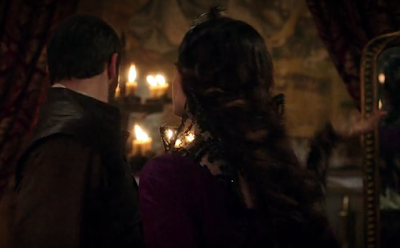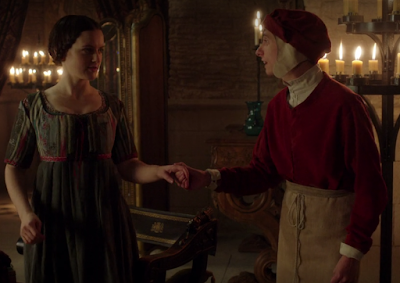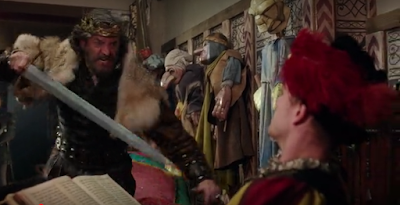Read the next entry here!
As the first season of Galavant nears its end, a series of potential resolutions are offered--and thwarted.
1.7, "My Cousin Izzy"
Written by Chris KochDirected by Scott Weinger, Jeremy Hall, Luan Thomas, and Joe Piarully
Synopsis
 |
| "Good talk, Son" incoming. Image taken from the episode, used for commentary |
As he makes plans to effect the group's escape, Isabella attempts to talk with him about their realization in the previous episode. Her parents quietly note to her that they had gotten a message to her cousin, Harry, whom she is intended to wed. She expresses disgust at the idea before being reminded of the incestuous nature of the family. Sid and the jester, Steve McKenzie, look on and comment on their lot in the plot.
 |
| They may only be "here for the jokes," but most of the audience is only there for the jokes...and some of them are good, at least. Image taken from the episode, used for commentary. |
Isabella notes the impending arrival of her cousin before Galavant exposits his goals--in song. But the lot are summoned to the throne room, where Madalena briefs Kingsley on who they all are. Richard and Kinglsey enter into a duel--by proxy. Kingsley chooses Gareth; Galavant volunteers to fight for Richard in exchange for the release of his colleagues.
 |
| Hers is the voice of reason here. Image taken from the episode, used for commentary. |
Galvant proceeds to the duel, only to have it interrupted by the arrival of Harry and his forces. A tense stand-off ensues as Harry comes to claim his fiance. The upset to plans is noted, and issues of protocol take precedence. Sid and Steve work to free the group, assuming Galavant is dead. A feast to honor the arriving prince offers an avenue of escape.
Gwendolyn approaches Vincenzo as he prepares the feast, suggesting that they poison the feasters in a surprisingly cheerful song. In the event, though, the chef settles for introducing allergens to the food, which begin to take effect as Sid and company proceed through their escape; Gwendolyn rebukes him for his seeming weakness but thanks him for his kindness. They seem to get on well as the allergy-fest proceeds.
Sid and company run into Galavant; Sid re-arms the knight, who fights his way through the room to Isabella and declares his love for her. Harry leaves in a juvenile dudgeon, and Galavant reprises his song at last--to the annoyance of all. And, somehow, Richard decides to fight his own duel--though Kingsley does not.
Discussion
A couple of things stand out in the episode as pointing towards medieval antecedents. One of them has to do with the narrative structure of the episode. In it, the show repeatedly moves toward a resolution that it then sets aside or thwarts entirely. Isabella is to be wedded to Harry--who leaves, instead. Galavant is poised to save the day repeatedly--and something interrupts. Richard adjusts the terms of the intended duel (about which more later), making a surprisingly noble gesture--that appears to be futile. Vincenzo is poised to kill the entire arrival feast--but demurs. In each case, expectations are set up, both internally to the episode and externally to the viewership, only to be subverted. In effect, the episode revels in a sort of pseudo-foreshadowing not at all unlike the device that appears in the Second Shepherds' Play, where the audience can expect that Mak will suffer far greater indignities than ends up being the case. (The two are also akin in the irreverently bawdy humor that suffuses both, which helps.)The other has to do with the idea of dueling. There is a long-standing trope in medieval and medievalist works that warriors could settle differences through combat--and that the results of such combat would be respected by participants and interested parties. The chivalric code depicted in Malory, for example, makes much of the idea, with most knights engaging in the behavior, and the work heaping scorn upon those who spurn the practice. (Jacqueline Stuhmiller addresses the topic in a 2006 Speculum article.) There is some historical justification for the trope; the judicial duel was, in fact, a recognized practice in much of medieval Europe (though it took forms not commonly depicted popularly), and there were, under certain law codes, provisions for proxies to conduct the actual fights (although such provisions usually only covered those unable to fight for themselves). No small amount of scholarship attests thereto. The present episode orbits--with a strange and lopsided orbit, to be sure--such a duel, establishing it in both historical and popular conception as medieval, and it makes some of the oddities in the series more sensible.
That a season of a television series would follow an overall story arc makes sense; having a notion of where a narrative will go helps it get there. That it would culminate--or appear it will culminate--in a judicial duel, a practice long recognized and popularly held as being of singular importance, also makes sense; it is a BIG DEAL, and such things make for good points of plot resolution. But, as is noted above, judicial duels would take specific forms, often involving sharp limitations on the arms and armor to be employed--which makes the odd reliance on swords without shields and only incomplete armor suddenly align with practice. If it is the part of the knight to fight on behalf of others in legalistic circumstances such as Malory presents, rather than to engage in the general fracas of outright warfare--and fictional depictions of knighthood, including that in Galavant, do tend to run that way--then the partial armoring and the eschewing of weaponry that would be much more brutally effective than a sword makes sense. It's a small point, and it is perhaps being stretched, but it is still an interesting invocation of the actual medieval in a medievalist production--another in a series seemingly replete with them.






















